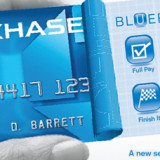As more optimism sets in concerning consumer finances, Chase Blueprint releases its new initiative aimed at helping consumers reinforce positive spending habits. The Resource Center for Mindful Spending was unveiled at Washington Post Live’s “Kitchen Table Economics” forum and is focused on helping customers take steps toward a better financial future. The new initiative comes in the wake of Chase’s Pulse of the Consumer Survey revealing that more than seventy-six percent of Americans are more optimistic about their finances; up 11 percent from last year.
The survey takes a comprehensive look at Americans’ financial habits and attitudes toward the economy. Forty-five percent of those surveyed believes their personal finances have already bottomed out and are getting better, a fourteen percent increase from last year. More than sixty percent believe the national economy has bottomed out and is stable or improving. In addition, consumers are even more optimistic about economic conditions around them, with sixty-seven percent believing their local economy is stable or improving.
The Resource Center for Mindful Spending draws upon the expertise of Chase and respected experts in areas ranging from finance to psychology. Consumers can delve into a wealth of resources and tools to help them better understand how why they borrow and spend the way they do will help them use their resources wisely.
Important Consumer Note!
No Credit/Bad Credit? Click here to build your credit score using a real credit card (not a prepaid or debit card that won't help your credit)!A high credit score can allow you to get a lower rate loan, lower your insurance premiums and may even help you get a job! (sponsor link)
Important Consumer Note!Want to get a prepaid Visa with no monthly fees with direct deposit and with more benefits and features such?
If so, then consider the Go2Bank Cash Rebate Visa- Click Here for More Info and to Apply Online in Just Mins (No Fee with Direct Deposit).
(Sponsor Link)
“As consumers begin to feel more optimistic about their financial situation, it’s more important than ever that we help them maintain good spending habits,” said Florian Egg-Krings, general manager, Chase Blueprint. “That’s why Chase Blueprint is launching a new initiative that provides research and information to help nurture a mindful spending movement. Together, we can help consumers strengthen the responsible spending and borrowing habits developed over the last few years.”
“Few question the importance of financial literacy, but we would benefit from a better understanding of how the human mind actually develops habits around spending and borrowing,” said Dr. Shefrin, the author of the paper and Mario Belotti Chair in the Department of Finance at Santa Clara University’s Leavey School of Business. “Based on a deep investigation of how people spend and borrow, this paper identifies three specific pathways for developing better financial habits.”
- Make budgeting as easy as possible by designing smart, nurturing programs that help people carry out the basics of managing spending and borrowing. This can involve things like: setting goals, developing budgets, tracking expenses, identifying ways to increase income, choosing appropriate lenders, matching a person’s credit cards to their specific needs and paying balances down intelligently.
- Use modern technology, specifically personal financial management tools to provide consumers with their current spending data in a straightforward method. Collecting spending data in one place can help consumers recognize spending patterns and correct bad behavior before it gets out of control.
- Turn finances into fun by using games to help instill better spending and borrowing habits in children, particularly during the K-12 years. Electronic games motivate students’ competitive instincts and activate the reward centers of their brains, all of which helps to make teaching them about mindful spending easier.
About the Survey
The 2013 Chase Blueprint Pulse of the Consumer Survey is an online omnibus poll of a nationally representative, randomly selected sample of 1,208 adults. It was conducted March 5-7, 2013. The margin of error is ± 2.8 percentage points.
About Chase Blueprint
Blueprint is available free of charge to new and existing Chase credit cardholders. It’s simple to set up, easy to use and customizable. With Blueprint, cardholders can save money and pay down balances faster. More information is available at www.chase.com/blueprint.
About Chase
Chase is the U.S. consumer and commercial banking business of JPMorgan Chase & Co. (NYSE: JPM), a leading global financial services firm with assets of $2.4 trillion and operations in more than 60 countries. Chase serves more than 50 million customers and small businesses through more than 5,500 bank branches, 17,500 ATMs, credit cards, mortgage offices, and online and mobile banking as well as through relationships with auto dealerships. More information about Chase is available at www.chase.com.
